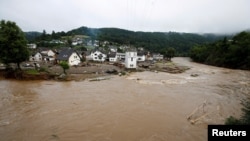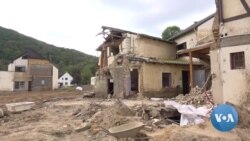On a warm September afternoon, the River Ahr winds gently through steep terraced vineyards and wooded valleys in a prosperous corner of western Germany. It’s difficult to believe the river, now running barely a foot deep across the scoured gravel, could swell into such a destructive force.
Eight weeks ago, as a storm system tracked eastward across Europe in mid-July, the Ahr valley was hit by unprecedented rainfall. In just a few hours, the water level rose by more than nine meters, inundating entire villages.
One hundred and thirty-four people were killed as the floodwaters tore down the narrow valley. More than 500 houses were swept away entirely, and thousands more severely damaged. Seventy-seven bridges were washed away, along with roads and railroads. While the Ahr has flooded several times in the past, scientists have blamed the intensity and volume of rainfall on climate change.
For the survivors, it has been a grueling two months: a daily effort to rebuild lives and livelihoods amid the choking dust and mud, while attempting to process the grief, the shock, and the realization that life in these communities will never be the same again.
Vera Zicken is a long-time resident of Altenahr whose home and nearby vineyards were damaged by the floods. “If you just look at our town, at how many houses are damaged beyond repair, how many houses have been torn down – all that remains are pieces of this town. And there are lots of houses that won’t be rebuilt,” she told VOA. “The fundamental problem is that with climate change, with this heavy rain that has impacted Germany, we have to take a different approach. We have to work towards taking preventative measures, so when this kind of rain happens again, the water can’t hit communities as hard as it did and cause this kind of damage.”
Will the climate crisis persuade German voters to take a new approach? Germany’s Green party is currently third in the polls, but their support has fallen in recent weeks. Paula Piechotta, a Green Party candidate from Leipzig, says a generational divide is holding Germany back.
“If something can be felt, people tend to change their attitude toward it. And climate change can be felt here. We had summers of drought, we had extreme rain, we had a lot of problems in our forests. So, we feel that climate change is actually real and it’s happening. However, we see a clear divide between younger and older people. Younger people under the age of 40 tend to prioritize environmental issues, climate issues in their voting decisions. Older people don’t,” Piechotta told VOA.
There also is a geographical divide. In the eastern state of Saxony-Anhalt lie some of Europe’s largest lignite mines, commonly known as “brown coal.” It is among the most polluting and least efficient sources of energy – and Germany is the world’s largest producer.
The government plans to close all its brown coal mines by 2038. Many Germans want them shut down much sooner. But there are two big questions: what would replace the tens of thousands of jobs that would be lost in an economically depressed area of Germany? And what would replace the brown coal that provides some 20 per cent of Germany’s electricity?
With Germany also phasing out nuclear power by the end of 2022, local officials say their lignite remains vital to Germany’s prosperity.
“Brown coal is still the number one energy source in our state,” said Rüdiger Erben, a member of the Social Democratic Party in the Saxony-Anhalt state parliament. “Wind and solar are great, but when the sun doesn’t shine or we have a day without wind, the basic energy supply for the industrial sector still has to be there. There is definitely a contradiction in what gets said internationally. Outside of Germany, you see a lot of pictures of our wind farms or massive solar parks, and at the same time, Germany is one of the biggest investors in brown coal worldwide.”
“There is this East German saying: ‘I am a miner, who can do more than me?’ This basically says that as a miner, you are the foundation of the economy,” Erben told VOA.
Back in the Ahr valley, many residents say they are too busy rebuilding to bother with politics. But there is also frustration that the authorities didn’t take preventative action.
“Of course, climate change was definitely part of the cause, but it was not the cause alone. They all kind of failed here. [Chancellor Angela] Merkel and her people, they failed, but I also believe the state politicians, they failed, too,” said 63-year-old Altenahr resident Hans-Jakob Zmudczynski.
Merkel’s successor faces daunting challenges: tackling the climate crisis while powering Europe’s largest economy; reconciling the climate-conscious youth with older generations; and continuing to balance Germany’s lingering economic and social divide between east and wes






